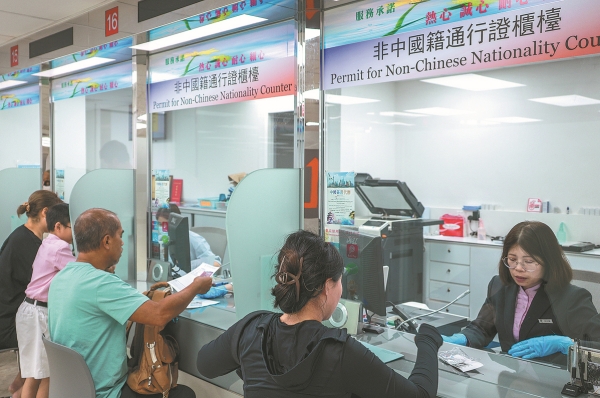Expats hail new mainland travel permits

Hong Kong permanent residents who are not Chinese apply for five-year permits to go to the mainland for short-term purposes such as business, tourism and exchanges at a service center in Hong Kong on Wednesday. ANDY CHONG/CHINA DAILY
Non-Chinese permanent residents of the Hong Kong and Macao special administrative regions applying for a new card-style Chinese mainland travel permit have welcomed its potential to facilitate business and leisure travel while calling for clearer and more detailed guidance during the application process.
When applications opened on Wednesday, a flood of non-Chinese permanent residents lined up at China Travel Service offices in the two regions to submit their documents. Some even arrived an hour before they opened.
The permits cost HK$260($33) and enable multiple entries to the mainland for five years. Each stay is limited to 90 days, providing flexibility for travelers to engage in business, tourism or other activities.
Applicants need to go to designated CTS offices in person to submit documents. The CTS office in Sheung Wan, Hong Kong, has set up two dedicated counters to process applications, with processing and issuance expected to take 20 working days.
A bank employee from the United States said everything went smoothly for his application in a CTS office on Hong Kong Island, as he had thoroughly checked the required documents in advance.
He said he's curious about the mainland and looks forward to traveling to Guilin, in the Guangxi Zhuang autonomous region, after he gets the permit.
South Korean Tony Kim Taejung, 33, works as an airline customer adviser and has lived in Hong Kong for around 11 years. He goes to Shenzhen, Guangdong province, every week for dining or shopping, but said the clearance procedure was cumbersome as he had to fill out an arrival card every time.
With the new permit, he will be able to use the e-channel to cross the border, without needing to present his passport.
Australian content creator Aaron Busch, who applied in Mong Kok, said the process could be challenging for expats who don't speak Chinese, as there was limited English guidance available at the office.
Two Indians failed to submit applications due to their inability to understand and read Chinese. Seeking the permit to engage in business on the mainland, they initially went to the immigration department, but were instructed to go to the CTS office first.
However, upon reaching CTS, they were redirected back to the immigration department. They said they still lacked clarity on the complete process and the required documents due to the lack of English guidelines.
At the CTS office in Mong Kok, many instructions and signs, including the CTS signboard, were exclusively in Chinese without any English translations, and it was challenging to find any information specifically related to the new permit.
Hong Kong Chief Executive John Lee Ka-chiu said the measure has been well-received, with online reservations nearly booked out.
Hong Kong is home to 270,000 non-Chinese permanent residents. According to the 2021 population census, 620,000 people in Hong Kong — including approximately 300,000 foreign domestic workers — are members of minority ethnic groups, accounting for roughly 8.4 percent of the population.
According to Macao media reports, the Macao government estimates around 19,500 people — 2.7 percent of the population — are eligible to apply for the new travel permit. Most of them are Portuguese, US citizens or Thai.
Fang Xue and Atlas Shao contributed to this story.
Contact the writers at amberwu@chinadailyhk.com





 play
play